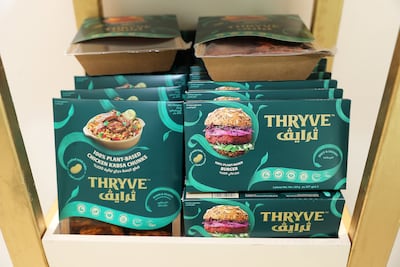Plant-based shawarmas, shish tawooks and koftas made in the UAE will soon be available on supermarket shelves.
The regional favourites, along with burgers and chicken nuggets, are being made in a new factory called “Thryve” at the sprawling Dubai Industrial City.
Iffco, the UAE food and beverage company that owns the facility, said it is the first plant-based meat factory in the GCC.
While the factory was formally opened on Friday, production has already commenced and the goods are expected to be on sale at Carrefour and Lulu in the next few weeks.
“The consumer trend is changing to a more sustainable, healthier and better diet,” said Andrey Dribny, chief executive of Iffco's culinary section, at the formal launch of the factory on Friday.
The science behind how the products are made, however, is a closely-guarded secret but involves mixing ingredients such as proteins, legumes such as fava beans and other components.
“[The science] is state of the art and hasn’t been introduced at a large scale yet but helps create texture which is difficult if you simply mix ingredients," said Mr Dribny.
About half of the ingredients are imported, with the other half sourced locally but the company’s ambition is to localise most of the ingredients.
“Our hero ingredient is the fava bean for all of our plant-based meat. Fava is very rich in nutrition.”

A batch of plant-based mince, for example, could be made in only a few hours.
And the price? While Mr Dribny would not disclose it at this stage, he suggested a 350 gram pack of mince will cost about 20 to 50 per cent more than an animal equivalent premium mince meat.
“We are targeting flexitarians,” he said, referring to a diet that includes more plant-based products but also some meat. "We want to emphasise this is plant-based and we are not trying to fool any consumers.”
Mariam Al Mheiri, Minister of Climate Change and Environment and Minister of State for Food Security, said the factory supports the UAE’s Food Security Strategy and its mandate to mitigate the impact of climate change.
"The opening of this innovative new facility also supports our efforts to protect the country’s ecosystems and enhance its food and water security and diversify our food sources," she said.
"By fostering such robust research and development focused on producing innovative food products, we seek to raise the UAE’s ability to move up the global food industry value chain and achieve first place on the Global Food Security Index by 2051.”
The innovation comes as the UAE seeks to bolster its food security by growing and producing more food locally. Blueberries, premium mushrooms and potatoes are all being grown in the UAE desert in everything from vertical farms to efficient greenhouses.
Globally the meat substitute market is big business. According to statistics from Ipes-Food (the International Panel of Experts on Sustainable Food Systems), the market is predicted to grow from about $4.2bn in sales in 2020 to $28bn in 2025. But the market share in the Middle East is smaller and, according to Mr Dribny, stands at about $15 million a year in the UAE.
"Average meat consumption is 70kg [per person] a year in this region," he said. "The recommendation is for 18kg.
“It is going to be a lot of work. But we believe consumers are ready,” said Mr Dribny, pointing to research his company did in Saudi Arabia showing that 70 per cent of people were ready to try these products. “Governments are also promoting this and getting the message across.”
Mr Dribny wants Thryve to reach five per cent of the regional market, and while the products have not yet gone on sale, he said the reaction from consumers at the UAE Gulf Food event in February was positive. And Thryve is aiming to expand into condiments and milk alternatives in the future.
"So far the reaction was overwhelming. We are quite happy.”


